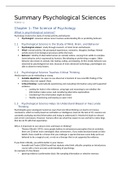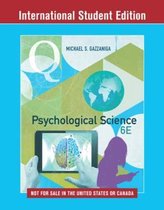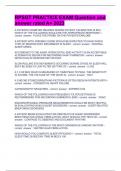Summary Psychological Sciences
PSMIN-11
Chapter 1: The Science of Psychology
What is psychological science?
Psychology involves the study of mental activity and behavior.
Psychologist= someone whose career involves understanding life or predicting behavior.
1.1 Psychological Science Is the Study of Mind, Brain, and Behavior
Psychological science= study through research, of mind, brain and behavior.
Mind= mental activity, like perceptual experiences, memories, thoughts, feelings. Mental
activity stems from biological processes within the brain.
Behavior= totality of observable human (or animal) actions, varying from subtle to complex.
Some behavior only is expressed by humans, like debating or performing a surgery. Other
behavior also shows in animals, like mating, eating, and sleeping. At first mostly behavior was
observed by psychologists but now, because of more advanced technology, psychologists are
able to observe mental states.
1.2 Psychological Science Teaches Critical Thinking
Media reports can be misleading or wrong.
Amiable skepticism= be open to new ideas but is hesitant of new scientific findings if the
evidence does not support them.
Critical thinking= systematically questioning and evaluating information using well-supported
evidence.
o Looking for holes in the evidence, using logic and reasoning to see whether the
information makes sense, and considering alternative explanations
o Considering if the information might be biased
o Healthy questioning and keeping an open mind
1.3 Psychological Science Helps Us Understand Biased or Inaccurate
Thinking
Psychologists gave catalogued numerous ways that noncritical thinking can lead to erroneous
conclusions, which is mostly based on motivation or intelligence (and not the lack of it!). Humans are
constantly analyzing received information and trying to understand it. Mostly this leads to relevant
and correct conclusions. However, humans often see what they expect to see and fail to notice tings
that do not fit with that expectation.
Why is it important to care about errors and biases in thinking?
- Thomas Gilovich (1991): more people believe in extrasensory perception than in evolution;
there are 20 times more astrologists than astronomers. If you make decisions based on false
beliefs, there could be a chance that you endanger a species (because some body parts are
believed to be a magical cure), or rely on a therapy that is not supported by evidence.
If you think critically, you will do better in your classes.
- Kowalski and Taylor (2004) found that students who think critically complete an introductory
course with a more accurate understanding of psychology.
An example of a few biases:
› Ignoring evidence (confirmation bias): like sampling information or selective memory.
, › Seeing relationships that do not exist: in the desire to find predictability in the world, we
sometimes see order that does not exist, which can lead to superstitious behavior.
› Accepting after-the-fact explanations (hindsight bias): once the outcome is known,
interpretations and reinterpretations are made to make sense of that outcome. Evidence can
become distorted because of hindsight bias.
› Taking mental shortcuts: heuristics (simple rules) are mostly used to make decisions, which
often lead to good decisions without too much of an effort. But it can also lead to inaccurate
judgments and biased outcomes: if it is reported in the news that women are more violated
in a certain area, people might be more cautious that that may happen to them as well. In
the meantime, much more “common” dangers like food poisoning or traffic accidents are not
thought about it that much.
1.4 Why Are People Unaware of Their Weaknesses?
People want to feel good about themselves, and this affects how they think. They use various
strategies to support their motivation, like their personal strengths if they succeed, and outside
forces if they fail. One factor that promotes overconfidence is that people often have difficulty
recognizing their own weaknesses.
Fremdschämen= experience of embarrassment for other people in part because they do not
realize that they should be embarrassed for themselves.
- David Dunning and Justin Kruger (2003, 1999) wrote a theory that people are often blissfully
unaware of their weaknesses because they cannot judge those weaknesses at all: e.g., you
have to know the difference between a good and a bad driver in order to know which one
you are. A lack of skill not only prevents people from producing good results, it also prevents
those people from knowing what good results are and those people do not know which
improvements have to be made in order to become a better [driver, etc.]. Teaching specific
skills can help to judge their performance.
What are the scientific foundations of psychology?
Psychology originated from philosophy in order to understand human nature. Confucius, for
example, discussed the importance of human development, education and interpersonal relations.
1.5 Many Personal Questions Have a Long History
The nature/nurture debate has been going on for a long period of time, even Aristotle and Plato
thought about it. Nowadays psychologists think that both nature and nurture interact in human
psychological development.
Nature/nurture debate= the arguments concerning whether psychological characteristics
are biologically innate or acquired through education, experience and culture.
Culture= the beliefs, values, and customs that exist within a group of people who share a
common language and environment.
Mind/body problem= a fundamental psychological issue: are mind and body separate and
distinct, or is the mind simply the physical brain’s subjective experience?
Throughout history, the mind was seen as residing in many organs of the body, including the liver
and the heart. The Egyptians embalmed the heart and threw out the brain, Romans and Greeks saw
that the brain played a more important role in human functioning by observing brain injuries.
Scholars, however, still believed that the mind was separate from and in control of the body (partly
based on religious beliefs). Around 1500, Leonardo da Vinci theorized that all sensory messaged were
processed in the brain, in the ‘sensus communis’. He believed this was the home of thought and
judgement. It wasn’t that accurate, but it was a first attempt in understanding psychological
functions and the brain. In the 1600s, Descartes described dualism.
Dualism= the mind and the body are both separate and intertwined.
,Descartes wrote that the body was governed by “reflex” and memory and imagination resulted from
body functions. Deliberate action was controlled by the mind, which was divine and separate from
the body. Nowadays, dualism is rejected: the mind does not exist separately.
1.6 Experimental Psychology Initially Focused on the Structure, Not the
Function, of Mental Activity
Psychology arose in the mid-1800s in Europe, built on the experimental method.
- John Stuart Mill: psychology should leave the realms of philosophy and speculation and
become a science of experimentation and experiment.
- Wilhelm Wundt: established the first psychology laboratory and institute. He stated that
psychological processes (products of physiological actions in the brain) take time to occur. He
used the method ‘reaction time’ to assess how quickly people can respond to events. He also
wanted to measure conscious experiences: he developed the method ‘introspection’, a
systematic examination of mental experiences that requires people to inspect and report on
the content of their thoughts.
Structuralism (mid-1800s)
- Edward Titchener: student of Wundt’s, used the method introspection.
Structuralism: an approach to psychology based on the idea that conscious experience can
be broken down into its basic underlying components, like ‘quality’, ‘duration’, ‘intensity’,
and ‘clarity’ when applied to a musical tone.
Wundt rejected this kind of introspection. Introspection is highly subjective which makes conducting
research harder.
Functionalism (1875)
- William James: welcomed students at Harvard (he was a professor there) to ask questions
during lectures. He also supported women studying at university, and educated Mary Whiton
Calkins, who was the first woman to set up a psychological laboratory and first woman
president of APA. James argues that the mind is more complex than its element and cannot
be broken down because of that. He states that the mind consists of an ever-changing,
continuous series of thoughts, which cannot be frozen in time. The mind’s elements matter
less than the mind’s usefulness to people (metaphor: when studying a house, a structuralist
would study the separate bricks, but those bricks together form a house which has a
particular function). How the mind operates should be studied.
Stream of consciousness: a phrase coined by William James to describe each person’s
continuous series of ever-changing thoughts.
Functionalism: an approach to psychology concerned with the adaptive purpose, or function,
of mind and behavior: the mind helps the humans adapt to environmental demands.
Evolution, adaptation, and behavior (1860)
Survival of the fittest (fittest has to do with reproductive success and survival and not merely
strength).
Evolutionary theory: a theory presented by the naturalist Charles Darwin: it views the history
of a species in terms of the inherited, adaptive value of physical characteristics, of mental
activity and of behavior. Darwin noticed species that evolved over time: animals that would
survive and reproduce made sure that those evolutional changes were passed along to future
generations.
Adaptations: in evolutionary theory, the physical characteristics, skills, or abilities that
increase the chances of reproduction or survival and are therefore likely to be passed along
to future generations.
Natural selection: in evolutionary theory, the idea that those who inherit characteristics that
help them adapt to their particular environments have a selective advantage over those who
do not.
, 1.7 Different Schools of Thought Reflected Different Perspectives on
Mind, Brain and Behavior
As psychology spread throughout the world, different ways of thinking about the content of
psychology emerged. Those different ways of thinking are called ‘schools of thought’. In addition to
structuralism and functionalism, there are five other schools of thought which dominated the history
of psychology for a while.
Psychoanalytic approach (20th century)
- Sigmund Freud: he speculated that much of human behavior is determined by mental
processes operating below the level of conscious awareness.
Unconscious: the place where mental processes operate below the level of conscious
awareness. Unconscious mental forces, often sexual and in conflict, produce psychological
discomfort and in some cases even psychological disorders. Freud thought that those mental
conflicts arose from troubled childhood experiences that are blocked from the person’s
memory.
Sigmund Freud developed psychoanalysis and pioneered the clinical case study approach.
Psychoanalysis: a method developed by Sigmund Freud that attempts to bring the contents
of the unconscious into conscious awareness so that conflicts can be revealed.
The patient and the therapist would work together to bring the contents of the patient’s unconscious
into his or her conscious awareness. Once this is achieved, the therapist helps the patient to deal
with them. Dreams would be analyzed and also free association would be applied (the patient would
talk about whatever for no matter how long). Much of Freud’s work is rejected nowadays, except for
the idea that mental processes occur below the level of conscious awareness, which was the idea of
Galton (Freud wasn’t the first to write about unconsciousness).
Behaviorism (1913)
- John. B. Watson: developed behaviorism.
Behaviorism: a psychological approach that emphasizes the role of environmental forces in
producing observable behavior.
The nature/nurture debate was a huge issue in behaviorism – Watson believed that all animals
(including humans) learn behavior by environmental experience. Environmental stimuli/ triggers
should be studied in order to understand and predict behavior.
- B. F. Skinner: believed that mental states were just a form of behavior. He developed operant
conditioning. Nowadays psychologists mostly believe that thought processes can influence
outcomes, they are not that “strict” anymore.
Gestalt movement (1912)
This school of thought is the opposite of structuralism.
- Max Wertheimer founded the gestalt movement in 1912, it was expanded by Wolfgang
Köhler.
Gestalt theory: a theory based on the idea that the whole of personal experience is different
from the sum of its constituent elements: if a researcher shows a drawing of a pipe, people
would see a pipe and not the separate lines of the drawing. It reflected the idea of
structuralism that a person’s observation is subjective and dependent on context.
Humanistic psychology (1950s)
Humanism focused on letting people be free to choose activities that make them happy and bring
fulfillment. Maslow and Rogers were humanistic psychologists.
Humanistic psychology: this approach focuses on the basic goodness of people and how they
become happier and more fulfilled.
- Martin Seligman: launched the positive psychology movement which value the quality of
relationships and taking enjoyments from life’s accomplishments.







